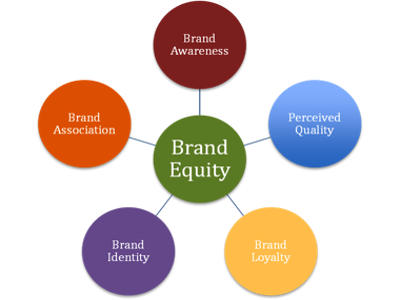Brand equity is the total value of the brand as a distinct asset. It is a marketing term that describes a brand’s value. It is a phrase used in the marketing industry that refers to the perceived worth of a brand in and of itself—i.e., the social value of a well-known brand name. That value is determined by consumer perception of and experiences with the brand. It is reflected in a way as to how consumers see; feel as well as an act towards a particular brand. It is based on the idea that the owner of a well-known brand name can generate more revenue simply from brand recognition, as consumers perceive the products of well-known brands as better than those of lesser-known brands. It includes fulfilling the business promise towards its customers along with maintaining the business-customer relationship well. When a brand consistently under-delivers and disappoints to the point where people recommend that others avoid it, it has negative brand equity.
Companies can create brand equity for their products by making them memorable, easily recognizable, and superior in quality and reliability. In the research literature, brand equity has been studied from two different perspectives: cognitive psychology and information economics. Building brand awareness can help marketers to increase brand visibility to the target audience through different advertisement campaigns. According to cognitive psychology, brand equity lies in consumer’s awareness of brand features and associations, which drive attribute perceptions.

Purpose
The purpose of brand equity metrics is to measure the value of a brand. When a company has positive brand equity, customers willingly pay a high price for its products, even though they could get the same thing from a competitor for less. A brand encompasses the name, logo, image, and perceptions that identify a product, service, or provider in the minds of customers. It takes shape in advertising, packaging, and other marketing communications, and becomes a focus of the relationship with consumers.
- Companies can charge a premium for products with lots of positive brands equity (think of designer brands).
- It can be transferred to a different product line, which in turn increases sales and revenues for the company.
- It increases market share as the brand is widely known, recognized, and preferred by consumers.
When consumers trust a brand and find it relevant, they may select the offerings associated with that brand over those of competitors, even at a premium price. It is the extra value a company gets from a product with a recognizable name, as opposed to a generic equivalent. When a brand’s promise extends beyond a particular product, its owner may leverage it to enter new markets. For all these reasons, a brand can hold tremendous value, which is known as brand equity.
















